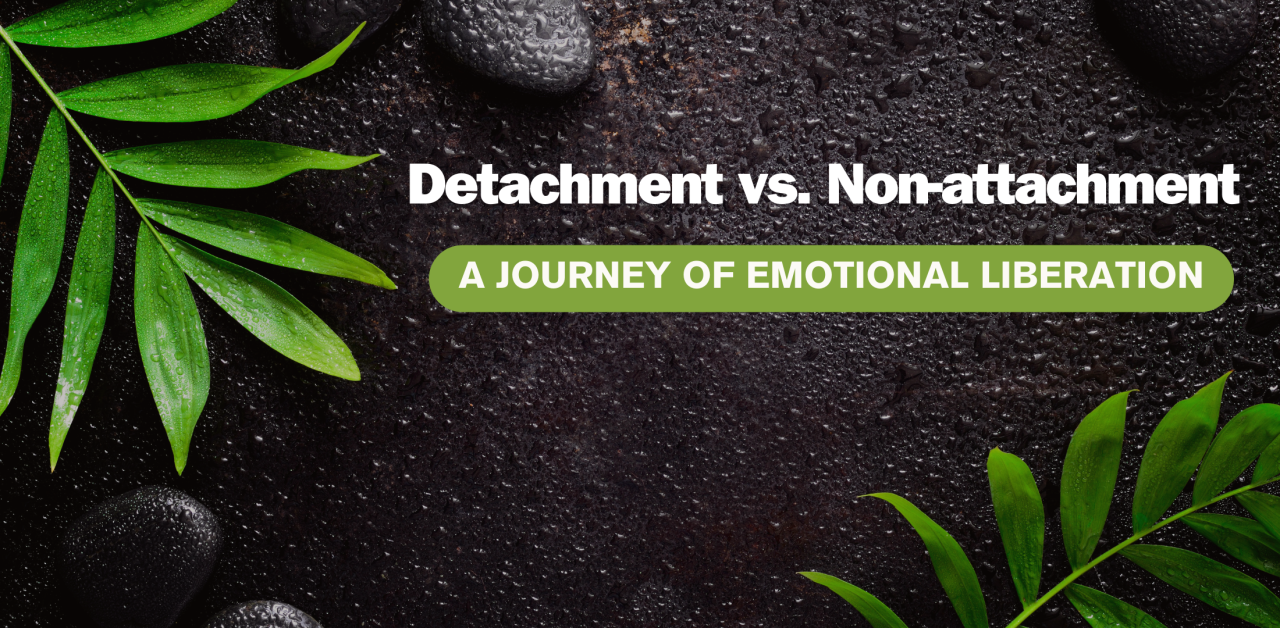
Detachment vs. Non-attachment: A Journey of Emotional Liberation
“Only by practice and non-attachment can we conquer our minds.” Swami Vivekananda
A looming mental health pandemic stares in our faces. We have just about scratched the surface on how it can be deadlier than any other pandemic the human race has experienced. Having gone through some personal experiences myself, I have been exploring the concept of detachment as I deepen my study through spiritual books, philosophy, ancient texts and commentary on spirituality. A few days ago I happened to stumble upon the concept of detachment versus non-attachment in a podcast that I follow. This urged me to investigate the subject further. In my inquiries I found out that, in the realm of personal growth and spiritual exploration, the concepts of detachment and non-attachment often intertwine, leading to confusion and misinterpretation. I was guilty of mistaking one for the other too. Although both terms share a common thread of letting go, they differ in their nuances and implications. Understanding the distinction between detachment and non-attachment is crucial for navigating the path towards inner peace and emotional liberation. Therefore, improving mental health which is often affected by increased anxiety.
As leaders, it is important for us to understand this distinction so that we are able to operate at our fullest. According to ancient Hindu texts - as a householder (grahast) one must practice non-attachment. However, ascetics (yogis) practice detachment to further their spiritual journey. My journey is towards personal growth and spirituality, while operating in this highly material and transactional world. Sharing below some of the things I learnt through my inquiries.
Detachment: A Conscious Effort to Distance: Detachment refers to a conscious effort to disengage or separate oneself from emotions, people, or situations that cause distress or suffering. It involves creating an emotional buffer to shield oneself from the negative impacts of external factors. Detachment can be a helpful coping mechanism in the face of overwhelming challenges or toxic relationships. It allows individuals to maintain a sense of composure and resilience in difficult circumstances.
Non-attachment: Embracing the Flow of Life: Non-attachment, on the other hand, transcends the notion of separation and delves into a deeper level of acceptance and equanimity. It's about embracing the impermanence of all things, understanding that clinging to desires or outcomes only leads to suffering. Non-attachment encourages individuals to engage with life fully without getting attached to specific results or outcomes. It's about flowing with the river of life, accepting whatever comes our way without judgment or resistance.
Ancient Wisdom on Detachment and Non-attachment : The concepts of detachment and non-attachment have been explored in ancient texts and philosophies for centuries. In the Bhagavad Gita, Lord Krishna advises Arjuna to act without attachment to the fruits of action. This principle, known as karma yoga, emphasizes the importance of focusing on actions rather than outcomes, fostering a sense of detachment and inner peace.
In the teachings of Stoic philosophers like Marcus Aurelius and Epictetus, detachment is seen as a means to achieve inner tranquility. They taught that individuals should distinguish between what they can control and what they cannot, focusing their energies on the former and accepting the latter with equanimity.
Navigating the Path to Emotional Liberation : The journey towards detachment and non-attachment is an ongoing process that requires self-awareness, mindfulness, and compassion. It's about recognizing our emotional attachments, understanding their root causes, and gradually letting go of them. This process can be challenging, but it ultimately leads to greater emotional freedom and inner peace.
Examples of Detachment and Non-attachment as we operate in our daily lives.
Detachment in the workplace: A manager who remains calm and composed during a stressful situation, focusing on solutions rather than getting caught up in emotions.
Non-attachment in relationships: A partner who loves and supports their significant other without expecting anything in return.
Detachment in facing challenges: An individual who experiences setbacks but maintains a positive outlook, viewing them as opportunities for growth.
Non-attachment in pursuing goals: A person who strives towards their goals with dedication but accepts whatever outcomes arise, without being attached to specific results.
Detachment and non-attachment are not about becoming emotionless or indifferent to the world around us. Instead, they are about cultivating a wise and compassionate relationship with our emotions and experiences. By understanding the nuances of these concepts, we can embark on a journey of emotional liberation, fostering inner peace and resilience in the face of life's inevitable challenges. The bar is very high, and practicing it is not at all easy. I am still learning, and I hope I am able to help through my own curiosity and practice.
Manager at Google
2mov good article..Thanks...god bless u ... had confusion about this concept since ages..u expressed n put it just right pitch perfect where the confusion was there ...thanks again.
Very powerful and thought provoking. Awesome insights Srushti